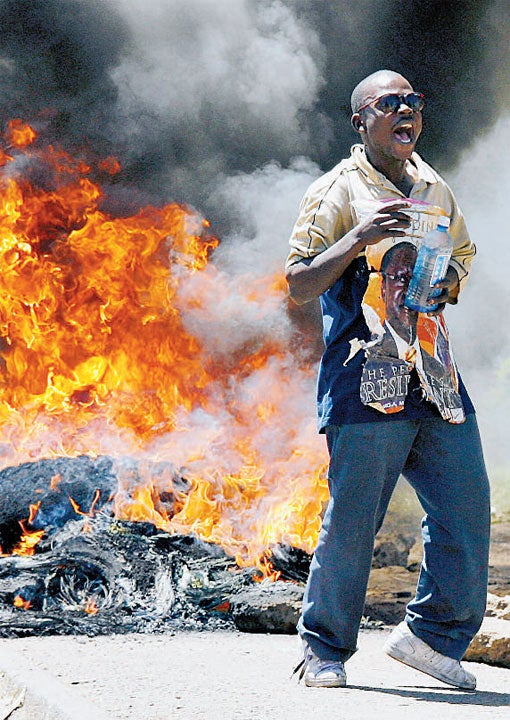Kenya rivals edge their way towards talks after poll violence

Your support helps us to tell the story
From reproductive rights to climate change to Big Tech, The Independent is on the ground when the story is developing. Whether it's investigating the financials of Elon Musk's pro-Trump PAC or producing our latest documentary, 'The A Word', which shines a light on the American women fighting for reproductive rights, we know how important it is to parse out the facts from the messaging.
At such a critical moment in US history, we need reporters on the ground. Your donation allows us to keep sending journalists to speak to both sides of the story.
The Independent is trusted by Americans across the entire political spectrum. And unlike many other quality news outlets, we choose not to lock Americans out of our reporting and analysis with paywalls. We believe quality journalism should be available to everyone, paid for by those who can afford it.
Your support makes all the difference.President Mwai Kibaki and the opposition leader Raila Odinga appeared ready last night to open talks aimed at ending the violence which has rocked Kenya. Their shift of position followed a day in which opposition supporters fought with armed police firing tear gas and water cannon.
President Kibaki, who was controversially re-elected on Sunday following allegations of vote-rigging, said he would be willing to talk, "once the nation is calm and the political temperatures are lowered".
Mr Odinga had previously insisted he would not talk to Mr Kibaki until he resigned. But last night his aides said he was willing to sit down with a man he has accused of carrying out a "civilian coup".
John Kufuor, the head of the African Union, whose arrival in the country had previously been blocked by the government, is expected to arrive to mediate by the weekend.
Kenya's Attorney General, Amos Wako, added his voice to those questioning the validity of last Thursday's election, calling for an independent inquiry. Mr Wako, a key ally of President Kibaki, warned that the country was "degenerating into a catastrophe of unimaginable proportions". The EU, meanwhile, urged the political opponents to form a coalition.
More than 300 people have been killed and at least 100,000 displaced in clashes that have become tribal.
The opposition Orange Democratic Movement (ODM) postponed until today a planned "million man march" in Nairobi's Uhuru Park, after police in riot gear and armed with machineguns blocked all routes into the city centre.
Outside Nairobi's Yaya shopping centre, normally filled with expats and upper class Kenyans, young men tore down kiosks and bus shelters and set them alight. "We wanted peace but this government refused," said Alan Andaika, 23, who was carrying a Raila Odinga banner in one hand and a wrench in the other. "Now we will destroy everything."
A cry of "Lorry! Lorry! Lorry!" rang out as a truck full of paramilitary police arrived. The demonstrators sprinted for safety as 30 officers jumped out and fired tear-gas canisters.
Less than 200 yards away, Musalia Mudavadi, an ODM leader, urged supporters to protest peacefully. "Anyone engaged in looting is not with us," he said.
Mr Mudavadi and his colleague William Ruto, then led a convoy of cars and more than 1,000 supporters towards Uhuru Park, the scene of the planned rally. After marching for half a mile down the road, rows of armed police blocked off the route, firing tear gas into the crowd. Hundreds of the marchers turned and ran.
In Kibera, Nairobi's largest slum, police fired tear gas and water cannons as thousands of ODM supporters tried to join the march into the city centre. Protesters shouted: "No Raila, no peace!" and urged the man they call the "people's president" not to hold talks with Mr Kibaki.
"He will not betray us and join in government with that man," said Rachid Muba-karat, 21. "There should be no talking. We will take the six provinces, Kibaki can have his two" Mr Odinga won more votes in six of Kenya's eight provinces.
Archbishop Desmond Tutu, who met Mr Odinga yesterday, said the violence had shattered Kenya's image as a "model of stability", while Kenya's national newspapers united with a single message yesterday morning, the words "Save Our Beloved Country" across every front page.
The continued instability has brought the economy to a halt. Supermarkets have begun to reopen but basic food and water supplies, particularly in the slums, are low. Prices have soared. One kilo of sikuma wiki, a green leaf used in most meals, has shot up from 10 shillings (7p) to 60.
Kenya acts as a crucial supply line for most central African countries. Uganda's President, Yoweri Musveni, yesterday became the first African leader to congratulate Mr Kibaki on his re-election. The United States is the only other country to offer congratulations, although it retracted the statement within 24 hours.
Join our commenting forum
Join thought-provoking conversations, follow other Independent readers and see their replies
Comments